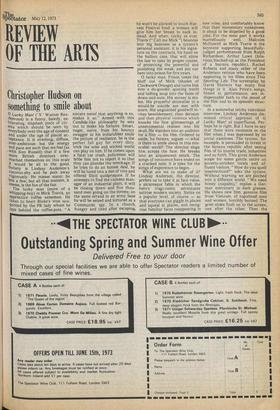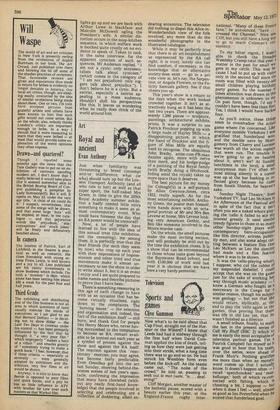REVIEW OF THE ARTS
Christopher Hudson on something to smile about
0 Lucky Man! (' X ' Warner Rendezvous) is a funny, bawdy, exhilarating, slapdash piece of cinema which should be seen by everybody over the age of consent and under the age of placid acceptance. It is overlong, diffuse, over-ambitious: but the energy and pace are such that we feel (as • With Ken Russell) that if a few more British directors overreached themselves on this scale It would be all to the good. Society is Lindsay Anderson's co. conut-shy and he pots away v.igorously. He misses many; he lilts a few; but all that matters, it seems, is the fun of the fair.
The lucky man (more of a whipping-boy) is Mick Travis, an apprentice coffee salesman. He takes to heart Blake's wise saw, quoted by the PR lady whom he lays behind the coffee-pots, "A
sincere belief that anything is so, makes it so." Armed with this Cundide-like philosophy he sets out to make his fortune. Smart, eager, naïve, from his bouncy swagger to his indiarubber smile the picture of resilience, he is the perfect fall guy for every dirty trick the wise and wicked world can play on him. If he comes upon a fatal car crash, policemen will bribe him not to report it so that they can plunder the wreckage. If he tries to do an honest deal, he will be lured into a den of vice and offered illicit quidproquos. If he attempts to find the canteen manager of an industrial plant, it will be closing down and five thousand men going on the streets; on the same errand in an army base he will be seized and tortured as a Communist spy. In a church, hungry and tired after escaping, he won't be allowed to touch Harvest Festival food: a woman will give him her breast to suck instead. And when, cocky as ever, Travis (" Call me Mick ") bounces into big business as a tycoon's personal assistant, it is his signature on the contracts, his hand on the bullion case, that will allow the law to take its proper course, of protecting the powerful and punishing the weak, and put our hero into prison for five years.
0 lucky man. Prison takes the bluff out of Mick (shades of Clockwork Orange) and turns him into a do-gooder, quoting tracts and ladling soup into the faces of down-and-outs. His money is stolen. His prayerful entreaties to a would-be suicide are met with scorn. His unguarded goodwill invites bewilderment, then derision and then physical violence which knocks the first glimmerings of unsentimental realism into his skull. He wanders into an audition for a film — his film. Ordered to smile, he frowns, argues — what is there to smile about in this miserable world? The director slaps him across the face. He breaks into an acquiescent smirk. The songs of innocence have ended on a cracked note: it is time for the songs of experience to begin.
What are we to make of it? Lindsay Anderson, the director, prefers us to take it at face value, a picaresque fable in which the hero's tragi-comic adventures satirise modern society. Satire on a popular level, of course — so that everyone can giggle in places and squeal in places, and recognise familiar faces reappearing in new roles, and comfortably know that their momentary uneasiness is about to be dispelled by .a good joke. For the most part it works marvellously well. Malcolm McDowell as Mick Travis is the keystone supporting beautifullyjudged performances from Ralph Richardson, Arthur Lowe (hilarious, blacked-up as the President of a banana republic), Rachel Roberts and many other of the Anderson retinue who have been
appearing in his films since This Sporting Life. The screenplay by
David Sherwin has many fine things in it. Alan Price's songs, filmed in performance, are in dispensable both to the mood of the film and to its episodic structure.
In a somewhat tetchy television interview, Lindsay Anderson dis missed critical appraisal of 0
Lucky Man! as superfluous. Perhaps he is right. But I have to say
that there were moments in the film when I was depressed by its jovial nastiness. The tycoon, for example, is persuaded to invest in the banana republic after seeing film of its tourist trade, industries and so forth. This gives Anderson scope for some gentle satire on poverty-stricken locals and affluent visitors." How do you quell insurrections?" asks the tycoon.
Without warning we are pitched into a different world. "We need honey (napalm)," replies a Ger man mercenary in dark glasses. He shows new film, genuine film from Vietnam, of napalmed men and women, horribly burned. The grim slides flash on to the screen, one after the other. Then the
lights go up and we are back with Arthur Lowe in blackface and Malcolm McDowell ogling the President's wife. A similar distortion occurs in the soup-kitchen sequence, in which welfare work is mocked quite cruelly on no evidence to speak of. Taken to task, in the same interview, for the apparent cynicism of such sequences, Mr Anderson replied, "1 am not a cynic: only sentimentalists talk about cynicism," (which comes in the category of "I am not prejudiced: only niggers talk about prejudice "). I don't believe he is a cynic. But a satirist, especially a satirist appealing to a mass audience, shouldn't shift his perspectives like this. It leaves us wondering what he really does think of the world around him.



































 Previous page
Previous page